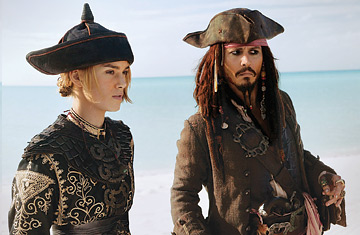
Keira Knightley and Johnny Depp in a scene from the film Pirates of the Caribbean: At World's End.
Trapped in a theater, with the visual effects flaming all around you, and the make-up artists trying to top themselves with increasingly yucky creations, there's not much you can do except close your eyes and nostalgize the not very distant past, when Johnny Depp and friends first offered their cheeky variants on the long-dormant pirate genre. If, by some miracle you doze off—hard to do with the thunderous score continually throbbing, and the yelling and explosions respectively yammering and thundering—don't worry. Wide awake you can't follow this story.
They're everywhere, these not-so-merry miscreants — in Singapore, in Antarctica, on a desert island, in a secret pirate cove, riding mid-ocean waterfalls (very odd, that bit), exchanging broadsides while being whirled about in a maelstrom. It is very exhausting, and it makes no sense whatsoever. From time to time the action stops dead in order for the actors to sneer and bellow at one another—lots of traditional "Avast me hearties" dialogue, which tends to remind us that Errol Flynn and his hammy crews used to do this sort of thing with more brio and fewer special effects.
If Pirates III can be said to have an emotional center — oops, sorry, how did that bit of middlebrow critical jargon worm its way into this context? — it has to do with father figures. They come and they go, causing a good deal of consternation among their offspring. The codger most appreciated by the audience is Keith Richards, well known to be Depp's inspiration for his character. He appears here as Jack Sparrow's old man, and he got a relieved round of applause at the screening I attended. Up to then the audience had been pretending to have a good time, even though it was succumbing to an increasingly sullen silence. But the old boy, with his grumbling voice, a few licks on a guitar-like instrument and his quite uncanny resemblance to Depp (at least in pirate drag) got their motors running for a few minutes. You wish they'd given Richards more to do, if only to let us gaze more deeply at the noble ruin.
Matter of fact, you wish they'd given Depp more to do. He enters the film quite late and, as usual, his performance is a canny blend of the minimal and the maximal. What laughs the films offer derive from his work, which consists of putting a kind of ironic, post-modernist spin on the antique conventions of the Yo-Ho-Ho genre. At one point in the proceedings someone asks of Sparrow, "Do you think he plans it all out, or just makes it up as he goes along?" Good question and one that's easily answered. He's a very smart and disciplined actor. You always sense that he knows exactly what he's doing, that nothing careless or wildly improvisational is being tossed into his performance.
On the other hand, if you asked that question of the screenwriters, Ted Elliott and Terry Rossio, and the director, Gore Verbinski, the answer would be different, For their film is not so much thought out as strung together — colorful incident upon colorful incident, but without logic, gathering suspense or any attempt to establish emotional connections between audience and actors. I must say, it's as boring to type out criticism of that kind as it probably is to read it, since some close variant of it could be written week-in, week-out every summer movie season. It's tempting to conclude with a joke about the title: Maybe they should have called it Pirates of the Caribbean: At Wit's End. But no, in the movie's epilogue Jack Sparrow is seen setting forth in a dinghy, chasing his pirate ship, which has been mysteriously purloined. It is, shall we say, an open-ended ending. God help us, we silently whimper. You mean they're leaving the door open for another one? And another. And
